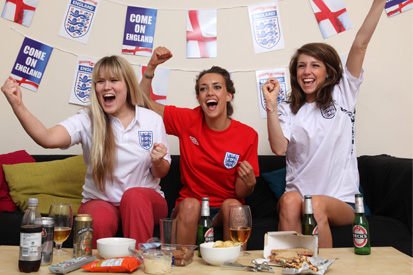
The guarantee of a good seat and an unobstructed view of the screen are just two of the reasons that consumers have been opting to tune in to World Cup football matches at home. According to Lightspeed Research, this is where 77% of consumers watched England's dismal performance against Germany on Sunday afternoon.
The stay-at-home consumer, whether on the much-discussed 'staycation' or embracing event TV, has been one of the strongest trends of the recession. Most analysts agree that, despite the recent easing of the economic outlook, it is here to stay. While many advertisers have focused their brand activation on pubs and bars, the research suggests that this secondary group should not be ignored.
There is little doubt that the World Cup is ideal event TV for Britain's army of stay-at-homes. Many a hard-up brand has been banking on the tournament to deliver a 'World Cup bounce' in sales. The initial signs are good: sales at household stores rose 1.7% as consumers invested in new TVs and home-entertainment systems ahead of the event. The Office for National Statistics says that in May, volume sales of consumer goods, excluding fuel, rose 3.4% year on year and were up 0.5% on the previous month.
Home comforts
Gemma Lovelock, managing director at TLC Marketing, which works with major supermarkets and household brands such as Kellogg, says consumers no longer expect to have to leave their front room to be entertained.
'The supermarkets have helped make staying in an event in itself,' she says, pointing to the surge in the number of finger-food, dine-in and party-at-home discount deals. In addition, many consumers now have a TV of a similar or superior standard to that in their local pub.
Supermarkets have been quick to cash in on the big event and Tesco, Asda, Sainsbury's and Marks & Spencer have all invested in World-Cup themed products and discount deals.
Across the board, the major retailers are reporting strong sales - themed World Cup promotions and products such as Asda's Vinda-Roo have also boosted sales (see box).
Supermarkets are not alone in cashing in on the stay-at-home consumer. For brands seeking to gain standout in crowded supermarkets and secure coveted shelf space, World Cup-related promotions have been crucial.
Kellogg's 'Feast of football' activity, for example, is a World Cup tie-in promotion that seeks to embrace the tournament without alienating potential customers who are not engaged with the event. It offered consumers incentives ranging from replica shirts and football-focused rewards to free gym memberships.
'Supermarket buyers have offered brands extra space to promote the World Cup in store,' says Lovelock. 'Some brands have chosen to ignore the tournament, as they don't feel they can compete, but my advice would be to embrace it - it's a mass audience and a massive opportunity.'
Ralph Risk, managing director, Europe, at Lightspeed Research, says the upswing in the number of stay-at-home consumers is a boon for advertisers. 'There is no doubt that you have less distraction than you would at a bar,' he says. 'Obviously there is the age-old problem of viewers using the ad breaks to make tea or snacks, but there is a real opportunity for brands to connect with these consumers through interactive messaging.'
The England team may have been knocked out, but the fact that brands and supermarkets are benefiting from the tournament should give some cause for celebration. Analysts at ABN Amro predict the World Cup-winning nation can expect a 0.7% boost to GDP - yet one more reason to rue the fact that England didn't emerge victorious.
Asda benefits from World Cup appetite
Asda has recorded a dramatic increase in sales of barbecue food as consumers emulate the England players' 'wags', who are stranded in the UK, with a whatever-the-weather World Cup BBQ.
According to the supermarket, it sold an additional 1.3m burgers in advance of the event, despite cloudy weather.
Finger-food was another top seller during the World Cup, with sales of pizzas up 35% in the first two days of the tournament.
Curry products, too, benefited from Britain's big nights in, with a 40% increase in sales over a two-day period. The supermarket's curry homage to striInsider's View: Sainsbury's.ker Wayne Rooney, the Vinda-Roo, helped to boost the category, although Chicken Tikka Masala remained the most popular dish.

